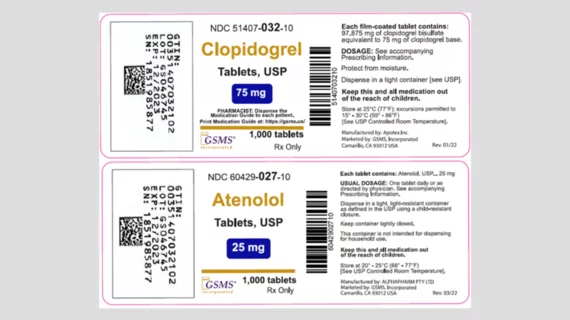FDA announces recall of 2 cardiovascular medications due to labeling mix-up
The U.S. Food and Drug Administration (FDA) has announced that Golden State Medical Supply (GSMS) is recalling two common cardiovascular medications due to a labeling issue. The medications involved are atenolol, which treats hypertension, and the antiplatelet agent clopidogrel, which reduces the risk of an acute myocardial infarction (AMI) or stroke among patients with a history of AMI, severe chest pain or circulation problems.
GSMS notified the FDA that a bottle containing 75-mg tablets of clopidogrel was accidentally given the label for 25-mg atenolol tablets. Only one lot of each medication—lot #GS046745—was affected by this mix-up. Both lots expired in December 2023.
“No other clopidogrel or atenolol products marketed by GSMS are impacted,” according to the advisory on the FDA’s website. “Both products are being recalled out of abundance of caution.”
GSMS has not received any reports of adverse events related to this issue, but the FDA advisory does detail some of the potential risks for patients.
“Patients who suddenly stop taking atenolol, as would happen if clopidogrel were misplaced in the atenolol-labeled bottle, are at increased risk for ischemic (angina, myocardial infarction), hypertensive and arrhythmic adverse events relating to rapid withdrawal of beta antagonism,” according to the advisory. “Further, patients who are on atenolol are frequently on concomitant anticoagulant and antiplatelet medications and would be at increased risk for bleeding if clopidogrel were added to the regimen.”
It is believed that a majority of these mislabeled medications were sold to one of two customers: AmerisourceBergen and McKesson. The two companies have been instructed to “immediately stop distribution, quarantine all remaining products in their control and return the recalled product to GSMS.”
Any adverse reactions believed to be associated with this issue can be reported to the FDA’s MedWatch Adverse Event Reporting Program. They can be submitted online or by mailing in this form.

